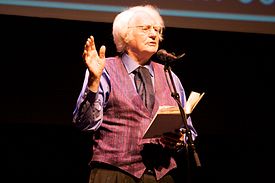 I love this form that tells a story but is more than a story. When it works, it really works, as this, by Robert Bly:
I love this form that tells a story but is more than a story. When it works, it really works, as this, by Robert Bly:
The Russians
“The Russians had few doctors on the front line.
My father’s job was this: after the battle
Was over, he’d walk among the men hit,
Sit down and ask: ‘Would you like to die on your
Own in a few hours, or should I finish it?’
Most said, ‘Don’t leave me.’ The two would have
A cigarette. He’d take out his small notebook—
We had no dogtags, you know— and write the man’s
Name down, his wife’s, his children, his address, and what
He wanted to say. When the the cigarette was done,
The soldier would turn his head to the side. My father
Finished off four hundred men that way during the war.
He never went crazy. They were his people.
He came to Toronto. My father in the summers
Would stand on the lawn with a hose, watering
The grass that way. It took a long time. He’d talk
To the moon, to the wind. ‘I can hear you growing’—
He’d say to the grass. ‘We come and go.
We’re no different from each other. We are all
Part of something. We have a home.’ When I was thirteen,
I said, ‘Dad, do you know they’ve invented sprinklers
Now?’ He went on watering the grass.
‘This is my life. Just shut up if you don’t understand it.’”
Robert Bly
from Morning Poems
HarperCollins, New York (1997),